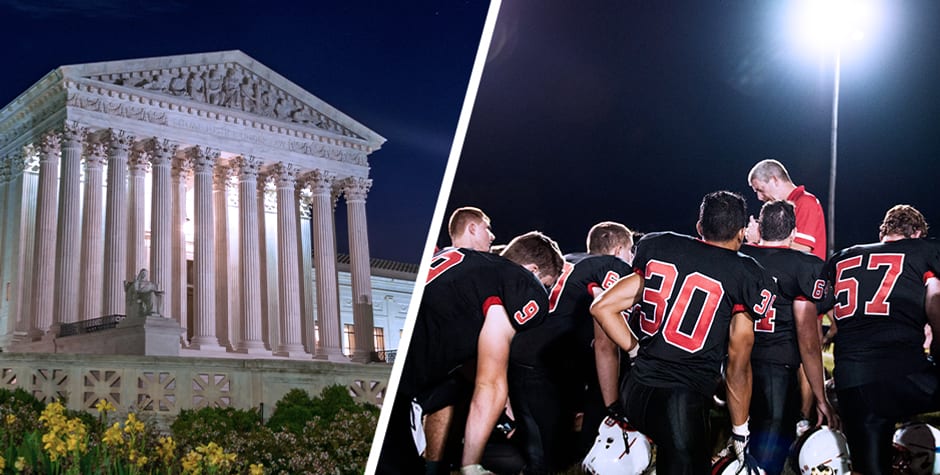ACLJ Asks Supreme Court To Take Case To Allow Christian Schools To Pray Before Football Games
Listen tothis article
The ACLJ filed an amicus brief urging the U.S. Supreme Court to grant review of a longstanding legal fight between a Christian school and a state athletic association. At issue in Cambridge Christian School v. Florida High School Athletic Association (FHSAA) is whether the FHSAA violated the school’s constitutional rights by forbidding the school from offering a pregame prayer over the stadium’s public address system.
The case arose in the context of football. Cambridge Christian’s practice was to offer a pregame prayer before every home football game. Other religious schools did the same. But when Cambridge Christian’s team made the finals, the FHSAA (which ran the competition) refused to allow the pregame prayer, even though the other team in the final – another Christian school’s team – also wanted the prayer! The FHSAA claimed it would violate the separation of church and state to have the two private Christian schools offer a prayer before their game against each other.
Cambridge Christian sued, but a federal district court dismissed the suit. Cambridge Christian appealed, and the ACLJ filed an amicus brief in 2017, supporting the school’s appeal. The U.S. Court of Appeals for the Eleventh Circuit reinstated the case in a victory for Cambridge Christian.
When the case was returned to the district court, that court again rejected Cambridge Christian’s lawsuit. The school appealed again, but this time it lost in the Eleventh Circuit. Now Cambridge Christian is petitioning the U.S. Supreme Court for review of the case.
Our filing urged the Supreme Court to grant Cambridge Christian’s petition. We made the point – which should be obvious by now – that “Government prohibition of religious speech, because it is religious, is classic viewpoint discrimination.” That’s what FHSAA did here.
We also addressed a more technical point on which the lower court hung its hat: Would the pregame prayer have been government speech or private speech? (If it’s government speech, the First Amendment does not apply. The government can generally say, or not say, what it wants.) You might think the answer here is also obvious – it would be Cambridge Christian praying, not the FHSAA. Yet the lower court got that wrong, taking the view that all pregame use of the PA system counts as government speech.
We explained why the lower court was mistaken:
[W]here, as in this case, the medium at issue (the PA system) features a mix of private and government messages, proper constitutional analysis must focus upon the particular, specific components of the activity or program at issue. Otherwise, the analysis would risk erroneously lumping government and private speech together under one, ill-fitting, blanket label. . . . To do otherwise would make it impossible to distinguish between, for example, a city event in a park and a private event in a park.
We elaborated:
[C]ommon sense – and sensible constitutional interpretation – require distinguishing between what is truly governmental and what is truly private, even where both elements coexist in a larger program. Only a focused analysis of the component elements can ascertain that distinction faithfully, without mislabeling some portion of the program or medium.
Thus, here there is no necessity to apply a blanket “government” or “private” label to the entire bloc of pregame speech over the PA system. Rather, a court should examine the component parts of the speech or medium to determine whether the particular content in question is government or private speech.
We added an important caveat:
This is not to say that private speakers always have a First Amendment right to access a government program that involves speech. Not so. The government, except in traditional public fora [like sidewalks and public parks], itself decides how, and how much, to open a program or facility to private messages. But the court below embraced the opposite error, exalting government control of the program at large over the obvious presence of purely private messages such as commercial advertisements.
We then stated the obvious: “Cambridge Christian’s proposed prayer would have been completely the work of private speakers.” To call that prayer “government speech” was just plain wrong.
The Supreme Court will likely consider Cambridge Christian’s petition later this summer to decide whether to grant review or simply deny the petition. If the Court does grant review, we will be ready to defend prayer.
